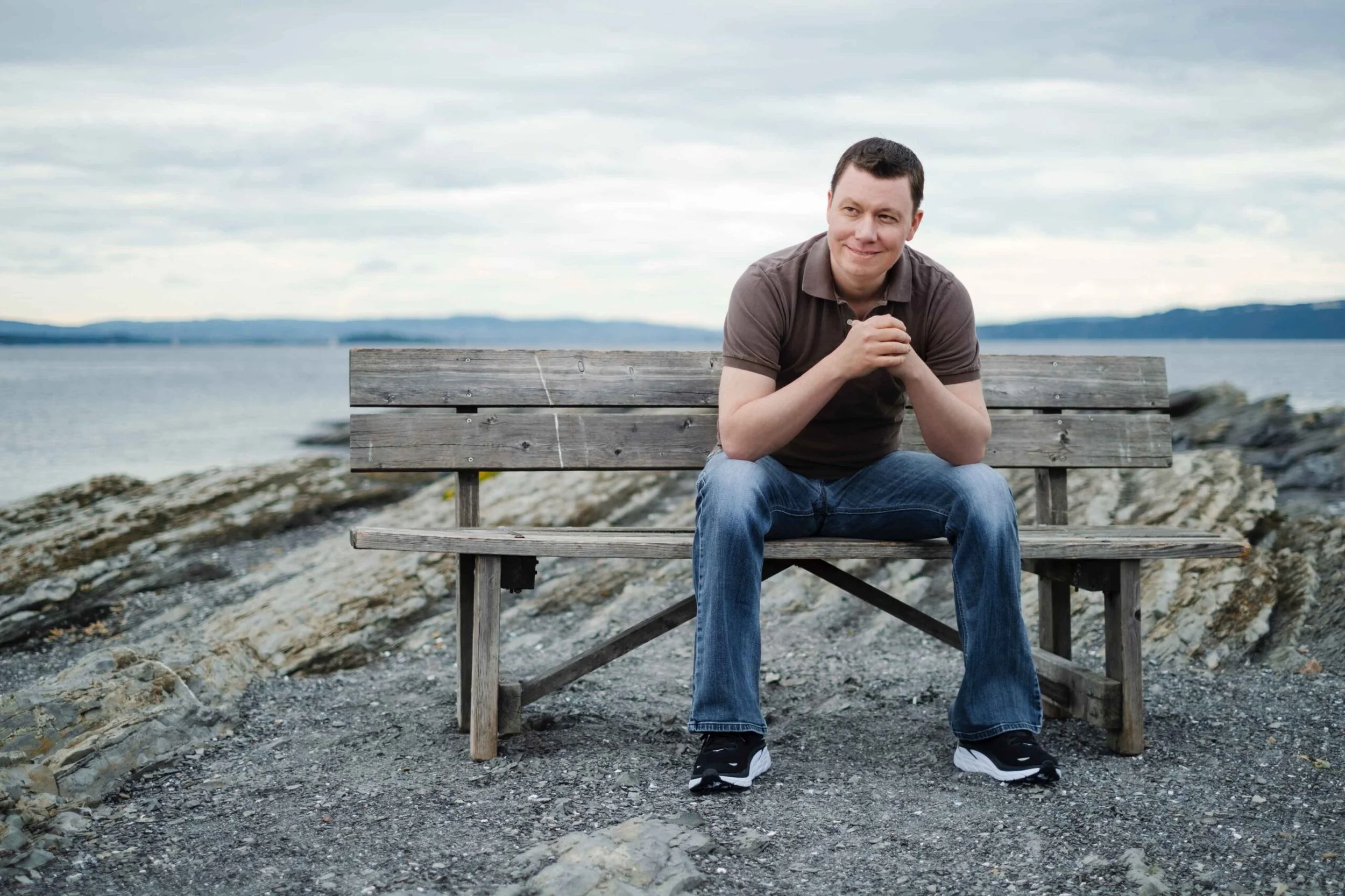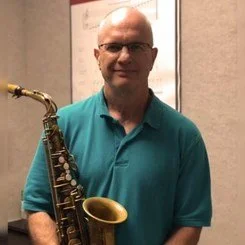Honoring Stories…becoming Beloved Community
Choral Evensong - October 5 at 4pm
Read below to go in depth and learn more about John Johnson, today’s guests, Saint George’s work towards Beloved Community, and the music offered in Evensong this evening.
About the Music | John Johnson | Saint George’s Social Justice Ministry
In thinking about Mr. Johnson, his work and witness, it reminds me of the power of one person, one witness, one voice crying out in the wilderness. Our voices carry, lifting up the cause of God to those with metaphorical ears to hear and eyes to see. As was the case with Mr. Johnson’s visit to us and our continued relationship with him, as we lift our voices others join. At first, perhaps, just one or two. But, then one or two begets three or four and so on and so forth. There is power in truth-telling. — the Rev. Crystal Hardin, former Associate Rector (From Dragon Bytes December 2021)
About the Music
Brenda Portman - Psalm Sonata No. 2
“When my spirit grows faint within me…” (Psalm 142)
“He heals the brokenhearted and binds up their wounds.” (Psalm 147:3)
“The Lord sets prisoners free…” (Psalm 146: 7b)
Psalm-Sonata No. 2 for solo organ was commissioned by the Association of Anglican Musicians for their 2025 Annual Conference in Cincinnati, Ohio. Because the premiere would be on June 19, the committee requested a piece that would commemorate Juneteenth in some way, such as the inclusion of spirituals. I had completed Psalm-Sonata No. 1 in 2021 and named it such because I knew I wanted to write a second one eventually, but several years passed without the right impetus for it. When I received this request from AAM, it seemed like the perfect opportunity, because the themes of oppression and liberation could provide direction for the selection of the psalms and spirituals used in each movement.
Feelings of desperation, despair, and exhaustion are encompassed in Psalm 142, which gives us phrases such as “I cry aloud to the Lord…my spirit grows faint within me…no one is concerned for me…no one cares for my life…I am in desperate need…rescue me from those who pursue me…set me free from my prison.” Using a modified sonata form for the first movement, I created a first theme based on these notions, and I chose “Go Down, Moses” as the second theme. This spiritual refers to the liberation of the ancient Jewish people from Egyptian slavery, but held a second meaning for enslaved African Americans because of the similarity of their slave experience and the hope that God would come to their aid. The majority of the movement is taken up by the exposition of the two themes, followed by a short development section and then a brief recapitulation of the second theme and then the first, but not exactly resembling their original appearances.
As in my first Psalm-Sonata, the middle movement is through-composed, but with recurring registrational ideas. I decided to focus on the third verse of Psalm 147: “He heals the brokenhearted and binds up their wounds.” This juxtaposed beautifully with the spiritual “Balm in Gilead.” After a melancholy and dissonant opening section, the mood becomes a little brighter and we hear the first statement of the spiritual (refrain), although it is buried in an inner voice and may not be detected except with careful study. A few short “fonds d’orgue” sections are interspersed among phrases, creating a warm sound to represent the comfort of God’s healing power. The next appearance of the spiritual (verse) is again in an inner voice, and rather dissonant. We finally hear the spiritual (refrain) with clarity at the end of the movement, played by an 8’ flute, with a warm resolution in D major.
The third movement is toccata-like, with mixed meters and fiery rhythms. Psalm 146 provides the framework for this celebratory material, especially the phrases “I will sing praise to my God as long as I live…he upholds the cause of the oppressed…the Lord sets prisoners free.” Though the spiritual represented in this movement is “Oh, Freedom” and the overall mood is triumphant, it is not without dissonance, because the struggle can be overcome but never forgotten.
Trevor Weston - Preces and Responses
I have always gravitated to music that mesmerizes and entrances its listeners by creating a sense of suspended reality. Music can be a portal to a parallel existence where our experiences, thoughts, and ideas are communicated through the more impactful abstract nature of aural stimuli. Music allows us to retreat from the mundane to reflect more proudly on our existence. My intention is to create music that is transformative regardless of instrumentation or style.
Time fascinates me. I tend to think of sections as music “in time” and music “out of time” or timeless, eternal. In numerous pieces, I use composed aleatoric sections to reflect a “stopping” of time in the overall development of the work. Often these sections represent the climax and the goal of the piece. Movement and development to the lack of movement often guides my musical forms.
Samuel Coleridge-Taylor - Magnificat and Nunc Dimittis in F
2025 marks the 150th anniversary of Coleridge-Taylor’s birth. Samuel Coleridge-Taylor was an English composer, conductor and political activist who fought against race prejudice with his incredible compositions.
Born in Holborn, a district in central London, in 1875 to an English mother and a father originally from Sierra Leone, he liked to be identified as Anglo-African – and was later referred to by white New York musicians as ‘Black Mahler', owing to his musical success.
His name was given to him after the famous poet Samuel Taylor Coleridge who, interestingly, became a great source of inspiration during his career.
Raised in a family of keen musicians, Taylor's father taught him to play the violin at a young age.
Taylor's classical compositions were heavily influenced by traditional African music and this made him one of the most progressive writers of his time.
He also became well-known for his use of poetry – particularly in his cantata trilogy, The Song of Hiawatha, which included the epic Hiawatha Overture and was based on a poem by Henry Wadsworth Longfellow. (from aso.org)
Read an NPR article here about the anniversary of Coleridge-Taylor’s birth.
Ola Gjeilo - Evening Prayer
Norwegian composer Ola Gjeilo is one of the most frequently performed in the choral world. An accomplished pianist, improvisations over his own published choral pieces have become a trademark of his collaborations.
He grew up in a musically eclectic home listening to classical, jazz, pop and folk, a broad background he later incorporated into his classical composition studies at The Juilliard School, the Royal College of Music in London. He is especially inspired by the improvisational art of film composer Thomas Newman, jazz legends Keith Jarrett and Pat Metheny, glass artist Dale Chihuly and architect Frank Gehry.
Ola is an exclusive Decca Classics artist, and his Decca albums include Ola Gjeilo and Winter Songs, also featuring Tenebrae, Voces8 and the Choir of Royal Holloway, as well as the solo piano albums Night & Dawn.
Ola’s music is published by Walton Music (choral), Boosey & Hawkes (wind band), and Chester Music (piano). For more information, please visit olagjeilo.com, or find Ola on his social media profiles.
Marty Nau, saxophonist.
We welcome Marty Nau to St. George’s and thank him for his collaboration on our anthem this evening, as well as on our hymns. Marty is a highly active and sought after jazz alto saxophone player in the Washington DC Area. Starting on the clarinet when he was in the sixth grade, Marty soon gravitated towards the saxophone in the ninth grade, playing in both the junior high and senior high school jazz bands. Upon graduating from high school Marty enlisted in the Navy Music Program. After coming to the Washington DC area in 1980, he played with such big bands as the “Blues Alley Big Band”, Bill Potts Big Band Guy Lombardo, and others. He has performed with the National Symphony and Richmond Symphony and has backed up such performers as Dizzy Gillespie, Eddie Daniels, Stanely Turrentine, Joe Williams, Rosemary Clooney, Ethel Ennis, Nancy Wilson, Maureen McGovern, Snooky Young, and many others. He can be heard on the Navy Commodores CD recording “Here and Now”. After playing lead alto and conducting for the Navy Commodores Marty retired in 1997.
David Hurd is a distinguished figure in the world of church music and concert organists in the United States. With a career spanning over four decades, he has received numerous awards, prizes, and honors for his exceptional contributions to the field. A faculty member at The General Theological Seminary of the Episcopal Church in New York City from 1976 to 2015, Dr. Hurd's impact on church music has been profound. He is widely recognized for his compositions, including hymns, choral works, and organ pieces, many of which are featured in hymnals across various denominations.
Dr. Hurd's performances have captivated audiences worldwide. From winning the 1977 International Congress of Organists to being featured at conventions and festivals, his virtuosity and musical insight have earned him acclaim from critics and peers alike. (www.stlukesatlanta.org)
About John Johnson
We welcome Kelly Elaine Navies to Saint George’s. Kelly Elaine has spent time recording John Johnson’s oral history. Her journey as an oral historian began over 30 years ago when she was an undergraduate in African American Studies at the University of California, Berkeley. She subsequently studied and worked with the Southern Oral History Program at the University of North Carolina at Chapel Hill and received a Master in Library and Information Science from the Catholic University of America. As the Museum’s specialist in oral history, Ms. Navies coordinates all aspects of the Museum’s oral history initiative. In addition to her work at NMAAHC, Ms. Navies’s oral history projects can be accessed at the Southern Oral History Program, the Reginald F. Lewis Museum of Maryland African American History and Culture, and the DC Public Library in Washington.
Wytheville Training School Cultural Center
Wytheville Training School Cultural Center seeks to preserve, collect and utilize artifacts and other materials of historical significance relating to African-American and rural education in Wythe County during the years of segregation. They foster a sense of history by enabling audiences to draw strength and perspective from the past and impart a purpose to the future. The provide access to computer and telecommunications technology and educational programs for adults and after-school tutoring/enrichment activities for youth. Our offering tonight goes to this Training School which John Johnson saved from ruin and attended as a youth. You can give here.








